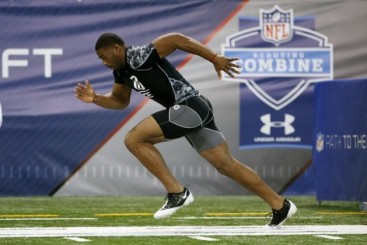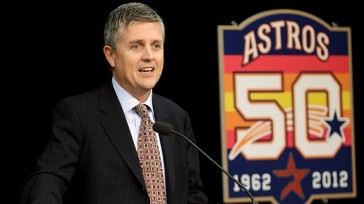
Today’s article: “Need for Speed,” Bill Barnwell, Grantland
Michael Rosen:
Woah, hey, we’re back! It’s been a bit of a hiatus, Cam — almost two weeks since we last published anything on the veritably hallowed pixels of Why Oh Why? A (Kinda) Mariners Blog. Outside Lands vacuumed the energy right out of both of us, and this last week’s been a recuperation period of sorts, but now, after a full week to recover, I’d say I’m back to full strength, 100%, ready to kill the game. The people have been clamoring, no doubt, and today, we’re here to channel Jalen and Jacoby (and whoever wrote that song) in GIVING THE PEOPLE WHAT THEY WANT.
(With an Email Exchange.)
That intro paragraph up there sounds pretty caffeinated, but I promise you I am still really tired, so I’m going to go make some tea really quick…
Okay, back. So into the exchange. Over these past two weeks, the sports content schedule has shifted from the absolute dog days of summer — i.e, only baseball to write about — to the slow approach of fall, which means…football!!!!!!
Today kicks off our coverage of the football season, which I think we can all agree to be pretty happy about. Baseball is certainly my favorite sport, but it’s nice to have some diversity in the articles up there on the interwebs to “exchange” about, and so this has been a lot of text that hasn’t once mentioned the article we’re going to talk about today, which is Barnwell’s piece on speed in the NFL.
So there are two main sections to this piece, and each respective section poses a different question. The first half of the piece is Barnwell attempting to measure the respective cumulative speeds of each NFL team, albeit with a hilariously flawed method (which he acknowledges). The second half highlights a way that this may be more accurately measurable, via a system reminiscent of the SportVU cameras recently receiving a revolution of their own in the NBA.
Barnwell nods his head to these metrics in the conclusion of the piece, when he quotes Doc Rivers upon hearing that Rajon Rondo runs 10 MPH on the court: “I don’t know the fuck that does.”
So what Barnwell seems to be getting at here is that speed may not be too meaningful, even if it was measurable to an extent. The teams listed at the top of his (somewhat arbitrary) chart aren’t really that great of teams, and the Rivers quote points at the idea that even if we could measure it to an extent, what value would that have analytically?
Personally, I value speed, likely because 1) I’m a pretty amateur NFL fan and 2) I played a lot of Madden growing up. The fastest players on Madden doubled as the most effective, at least from my perspective. Who can forget Michael Vick on Madden 2004, scrambling for 10 yards on every single drop back? Those formative moments of playing Madden likely skewed my perspective of speed — for example, when the Eagles signed (I think) Jeremy Bloom, an Olympic athlete, as a kick returner a few years back, I was sure his speed would make him the best in the game.
Now, I understand better that vision, patience, etc. play a larger role than how fast someone goes when mashing the right trigger button on a controller, but intuitively, it doesn’t make sense that speed makes zero difference in the NFL. And maybe it doesn’t, but the extent to which it does matter is probably greatly overestimated by the common fan.
My question to you: does that even matter? What are the implications of the casual fan overestimating the importance of speed?
Cameron Seib:
Feels good to be back, Mike. Between driving to and from San Francisco, all the hype and delirium that surrounds a Kanye set, and getting sufficiently drunk for a Tom Petty concert (hint: you’re never sufficiently drunk), my mind’s been in recovery mode lately. But after a week of mental hibernation, I, too, am ready to GIVE THE PEOPLE WHAT THEY WANT.
Watch out, world, because Why Oh Why? is about to go on a run of production the likes of which the amateur blogosphere has never seen.
Barnwell’s article is pretty silly. Speed in the NFL is a fun topic that has, can, and will be discussed forever, but this piece doesn’t ever amount to saying much. Its conclusion is, like, hey, there’s no correlation between a team’s six fastest offensive players and its overall offensive production. Craaaaazy.
But, yeah, Barnwell acknowledges it’s nothing of much weight, so no use in treating it as such. Let’s just thank Bill for launching today’s discussion and leave it at that.
When Barnwell ranks teams by offense, he uses Football Outsiders’s “offensive DVOA” stat (defensive-adjusted value over average). More interesting to me than the teams that don’t necessarily rate well by this metric (the fast ones), were the ones that do. I headed over to Football Outsiders myself and checked the offensive DVOA numbers for 2013. The top five teams in the NFL last season were the Broncos, Chargers, Eagles, Patriots, and Saints.
After I saw that, I looked at quarterback numbers. The website uses DYAR (defense-adjusted yards above replacement) to assess QB performance. In 2013, each of the top-five overall offensive teams by DVOA had a top-six QB by DYAR (Atlanta’s Matt Ryan snuck in at number four). Maybe the NFL’s best offenses aren’t made via speed, but via great QB play. Craaaaazy.
I did like what Barnwell got to in the second part of his post, at least how he used Doc Rivers’s philosophizing to illuminate his point. Football purists will buzzword you into oblivion about how “intangibles” are the really important measures of a player, not quantifiable things like speed, strength, etc. And while that’s complete bullshit, there is, quite obviously, more to a good football player than raw physical ability. Richard Sherman looks slow as shit compared to some corners, yet he’s better than any in the game. Which brings me back to the Rivers quote. Even if we had perfect speed-capturing statistics, I don’t think they’d be of much use to NFL teams, because a player’s fleetness seems to be such a minor factor in their overall success in the league.
Why some organizations continue to covet speed, then, is a bit of a mystery. Obviously, some of it has to do with owners and general managers who think they’re smarter than the numbers and fuck nerds they don’t know football and speed kills. But I think another possible answer is in what you brought up, about casual fans overvaluing speed. A fast player is fucking fun to watch. When Devin Hester was in his prime, I would tune into Chicago games specifically for his kick returns, to watch him torch other special teams players. A wildly fast player can put the proverbial butts in proverbial seats, and I’m sure NFL front offices are aware of this. So maybe fans’ love of speed is in someway responsible for the employment of guys like Bethel Johnson.
I don’t really know what other questions I have on this matter, so I guess just spit what you please, Mike. As far as other topics are concerned, though, why is tea your caffeinated beverage of choice?
MR:
Yeah, three days of a music festival and the requisite partying are enough to make you swear off drinking for a while. Of course, that doesn’t last more than a couple of days, but oh well. Luckily, we have enough #throwbackthursday material for the next month or so. That’s no Watershed, but it’s pretty significant.
I’ve liked what you’ve teased out of this Barnwell piece, though. That’s something I hadn’t though of: that the employment of these super-fast players may simply be for the enjoyment of their fanbase. It’s a little bit “out there” of a theory, since it seems like every single roster spot on an NFL team (at least according to the kind of insane Seahawks blogosphere) is of the greatest importance of all-time, so it’s hard to see an NFL GM sacrificing one of his precious spots to appease the ownership. Then again, the ownership is the only ultimately calling the shots.
Wow, Bethel Johnson, that is a throwback. That’s probably (hopefully?) the last time I hear that name for the rest of my life.
Yeah, I don’t have much more to say here, so I’ll get to the most important thing to address here today: the tea vs. coffee (vs. caffeine powder?) debate. Part of this is just a personal preference issue. I find myself being pretty sensitive to caffeine, so if I drink even a cup of coffee, I feel like I’m on hard drugs for about an hour and then crash like a popped balloon. It’s certainly interesting, but not sustainable on the day-to-day level. Tea has a low enough caffeine content to not make me trip caffeine balls, but it’s enough to wake me up and get me focused. Objectively, though, the taste of nice earl grey tea is so much better than coffee. I can’t drink coffee without filling half the cup up with milk, and I don’t put a drop of sweetener in my tea. Fuck the people who say coffee is an “acquired taste,” that just means it tastes like shit and people tolerate it because they’re addicts.
CS:
Wait, you drank at Outside Lands? I was sure you’d sworn off alcohol before the festival started.
NFL time was fun, but the matter of caffeine really is today’s most pressing. This will be a two-part rant, which I will begin by arguing for caffeine’s sublime effects, and then finish by selling coffee’s superiority the best I can.
It almost seems like arguing for the benefits of caffeine is an unnecessary endeavor. Americans love coffee, for one. Have you ever played the game “How long will it take me to get from one Starbucks to the next?” If it’s more than five seconds, you live in North Dakota.
That said, I’ve always felt that our society subtly pushes the notion that caffeine is bad for you. When we were growing up, companies had to put the caffeine content on their soda cans. But not anymore, and why would a company try to conceal that information, unless they thought high caffeine content would scare away consumers? That’s just one silly example, but I think it’s representative of a population in which nearly everyone who depends on caffeine laments it as a necessary evil.
Fuck all that. Caffeine is a wonder drug. Proof: this New York Times article. It references on a study in which coffee-drinkers lived longer, and others which reported a link between drinking coffee and lowered risk of Type 2 diabetes, numerous types of cancer, and Alzheimer’s. People contribute millions of dollars each year to cancer research, and it’s like, dudes, just open a few Starbucks in areas that are without.
And don’t listen to those dissenters who warn of caffeine’s hidden horrors. Anything they tell you is bullshit. Let’s go item by item through Wikipedia’s list of caffeine’s “negative effects.” None of them stand up to scrutiny.
Caffeine can increase blood pressure in non-habitual consumers.
Solution: become a habitual consumer.
Caffeine may reduce control of fine motor movements (e.g. producing shaky hands).
Again, become a habitual user and develop some fucking tolerance, and this won’t happen.
Caffeine can increase cortisol secretion.
Oh no!!!
Caffeine can contribute to increased insomnia and sleep latency.
Uh oh! Looks like one of the benefits slipped into the negatives list. Stupid Wikipedia, so many errors.
Caffeine is addictive. Caffeine withdrawal can produce headache, fatigue and decreased alertness.
Solution: continue fighting diabetes, cancer, Alzheimer’s, etc. and don’t let withdrawal happen.
High doses of caffeine (300 mg or higher) can cause anxiety.
Solution: don’t drink coffee like water.
High caffeine consumption accelerates bone loss at the spine in elderly postmenopausal women.
Solution: worry about it when you get to that stage in life.
So right there I’ve given a fairly exhaustive argument for why caffeine is a natural wonder and all that’s left now is showing why coffee is the best way to consume said miracle. In the end, it just isn’t burdened by drawbacks like other caffeinated substances are. It’s funny that you make fun of coffee’s taste, Mike, because as much as it is an acquired taste, it still beats tea, which has no taste. It’s essentially just hot water. As far as energy drinks go, you can’t bring a Monster into the office every morning unless you organize monster truck rallies. And as for caffeine pills, good luck telling people you take them without those people assuming you also deal crack.









